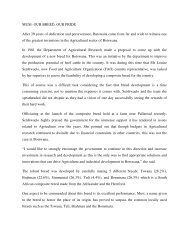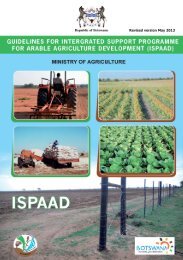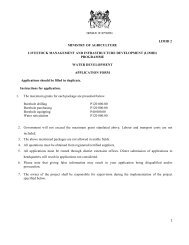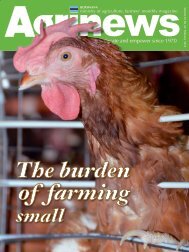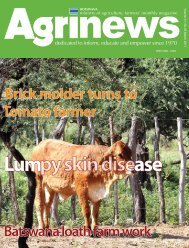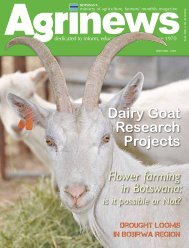Botswana's karakul renaissance - Ministry of Agriculture
Botswana's karakul renaissance - Ministry of Agriculture
Botswana's karakul renaissance - Ministry of Agriculture
You also want an ePaper? Increase the reach of your titles
YUMPU automatically turns print PDFs into web optimized ePapers that Google loves.
GOVERNMENT TO VACCINATE<br />
FOR MANGE DISEASE<br />
Article: Felix Mothatego<br />
Photos: Henry Toto<br />
The government has decided to begin free<br />
treatment <strong>of</strong> all small stock in Kgalagadi area<br />
for Mange disease or Lephalo in vernacular,<br />
this May.<br />
This was said by the minister <strong>of</strong> <strong>Agriculture</strong><br />
Christiaan De Graaff during Kgotla meeting<br />
with farmers in Hukuntsi and Kang. He said<br />
his ministry reversed the decision to ask<br />
farmers to buy treatment drugs from Livestock<br />
Advisory Center (LAC) or mobile LAC, to treat<br />
their sheep and goats.<br />
The ministry made this move because some<br />
poor farmers could not afford to buy the drugs,<br />
and there was shortage <strong>of</strong> drugs in LAC around<br />
the country. Government could also not<br />
intervene by <strong>of</strong>fering a free treatment, because<br />
<strong>of</strong> the financial recession. Hence the desired<br />
goal <strong>of</strong> reducing the disease could also not be<br />
achieved.<br />
The disease increased and later spread<br />
throughout Kgalagadi district. As a<br />
consequence, the ministry instituted a control<br />
strategy <strong>of</strong> eliminating the disease in the<br />
district, and to increase public awareness.<br />
Movement <strong>of</strong> small stock within, into and out<br />
<strong>of</strong> the district is prohibited, except for direct<br />
slaughter within the district. He said the<br />
success <strong>of</strong> the strategy depends on farmers’<br />
commitment and cooperation.<br />
He urged them to avail their livestock for<br />
treatment, on the specified treatment days. All<br />
goats and sheep regardless <strong>of</strong> age would be<br />
treated twice at two weeks interval.<br />
The Deputy Director in the Department <strong>of</strong><br />
Veterinary Services Dr. Letlhogile Modisa<br />
said in an interview, that mange is a parasitic<br />
disease. The parasite causes an infestation <strong>of</strong><br />
the skin, causing<br />
Irritation or itching in the animal infected. The<br />
mange in Kgalagadi is caused by a parasite<br />
called Sarc optic Mange.<br />
He said not only has it affected this district,<br />
also on the fringes <strong>of</strong> the neighboring district<br />
they do see some cases. It affects goats and<br />
sheep usually in the months when they have<br />
to crowd together, therefore overcrowding is<br />
one <strong>of</strong> the predisposing factors for the disease.<br />
He said this disease is normally present in<br />
the population but, once in a while where<br />
overcrowding is common it becomes a bit<br />
beyond the usual occurrence<br />
When an infected animal comes in contact<br />
with those that have not been exposed to the<br />
parasite, it passes the parasite to those not<br />
affected. It resides on the skin <strong>of</strong> the animals,<br />
feeding on dying skin tissues while causing<br />
loss <strong>of</strong> hair, and itching in the animals affected.<br />
This animal eventually loses quite significant<br />
amount <strong>of</strong> hair because <strong>of</strong> itching, and<br />
scratching against objects.<br />
He said prevention <strong>of</strong> the disease is by<br />
guarding against overcrowding <strong>of</strong> the animals,<br />
and by imposing a ban on movement <strong>of</strong> goats<br />
and sheep from where there are cases. Farmers<br />
however, have to note that transportation <strong>of</strong><br />
meat itself does not spread the disease, so<br />
people could transport meat from wherever<br />
they want to their destinations. Dr. Modisa<br />
also said other products such as milk do not<br />
transmit the disease.<br />
He appealed to farmers to try and control this<br />
disease by observing movement protocols,<br />
and round up their small stock to facilitate the<br />
injection <strong>of</strong> these animals. He said the drug<br />
they would be using has got a withdrawal<br />
period <strong>of</strong> fourteen days. Therefore, fourteen<br />
days after the injection animals should not<br />
be slaughtered for consumption, although<br />
they understand that this would be an<br />
inconvenience. They also discourage farmers<br />
to try and keep some animals away from<br />
treatment under the pretext that they would<br />
be slaughtered soon, because these goats and<br />
sheep would infect others once the treatment<br />
drug is finished in the system.<br />
He said they would not encourage anybody to<br />
skip treatment for any reason, because there<br />
is no good reason to skip this treatment. Even<br />
those who treated their animals have to bring<br />
them for treatment, because this treatment has<br />
to be done simultaneously in order to wipe<br />
out the parasite. Dr. Modisa said the drug they<br />
are using is not a vaccine but a parasiticide,<br />
and kills a number <strong>of</strong> parasites in small stock<br />
including internal ones. “So we are killing two<br />
birds with one stone”, he said.<br />
However, there are some other blood parasites<br />
that would not respond to this treatment such<br />
as Heart water and Ana plasma amongst<br />
others. He said when it comes to ecto parasites<br />
such as s<strong>of</strong>t ticks, the treatment would be a<br />
replacement and farmers would not have to<br />
apply other medications. If they happen to<br />
want to do so, they appeal to them to contact<br />
their nearest Veterinary <strong>of</strong>fice for advice on the<br />
matter.<br />
He said technically this is not a vaccination;<br />
it is what they call chemoprophylaxis. The<br />
more animals they cover the better because if<br />
they could cover all the goats and sheep, they<br />
anticipate that they would leave no goats and<br />
sheep where the parasite could reside to infect<br />
other animals<br />
May 2010



